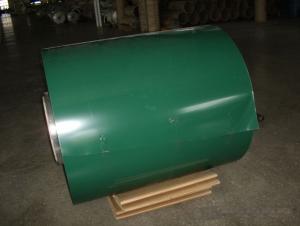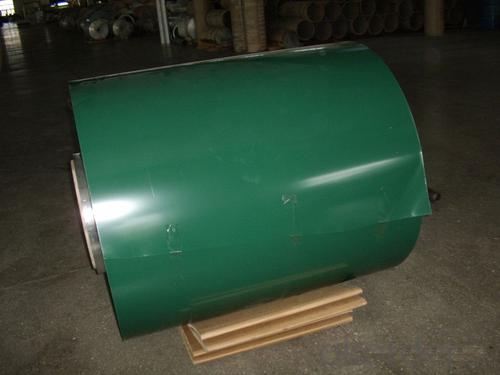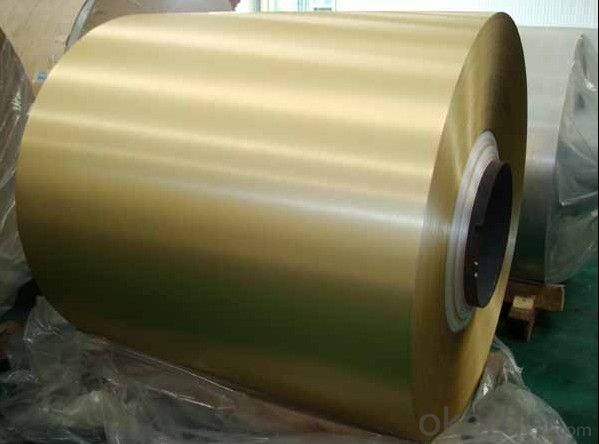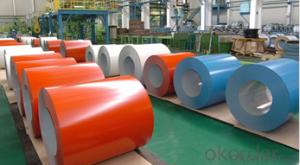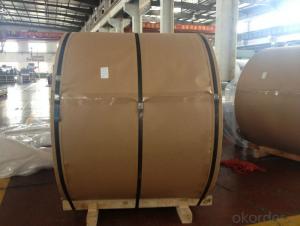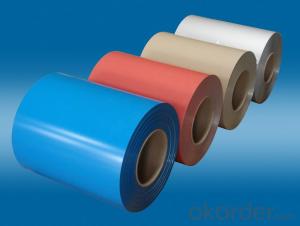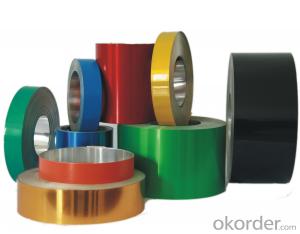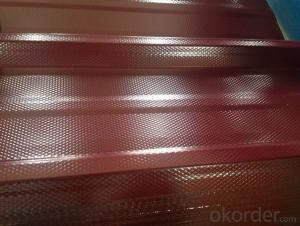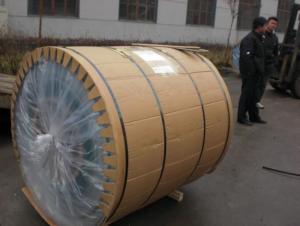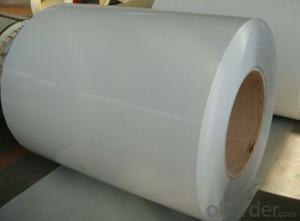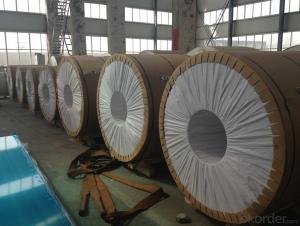Coil Coated Aluminum Coil/Roll for Aluminum Roofing Panel
- Loading Port:
- Shanghai
- Payment Terms:
- TT OR LC
- Min Order Qty:
- 2 m.t.
- Supply Capability:
- 50000 m.t./month
OKorder Service Pledge
OKorder Financial Service
You Might Also Like
Specification
Coated Aluminium Coil/Roll For Aluminium Roofing Panel
Description
Alloy | 1060, 1100, 3003, 8011, etc. |
Temper | H16, H18, H24, H26, H28 |
Thickness | From 0.05mm to 3.0mm |
Width | Standard width:1240mm |
Special width:1300mm, 1520mm, 1570mm, 1595mm | |
Diameter | Standard dia:1200mm |
Interior dia:150mm,405mm,505mm | |
Weight | 2.5 T/coil,3.0 T/coil |
Coating | PE, PVDF, ACRYLIC |
Surface | Embossed, mill finish, coated |
Color | AS to code RAL |
Gloss | 10-90%(EN ISO-2813:1994) |
Coating Thickness | PE: more than 18 micron |
PVDF: more than 25 micron | |
Coating Hardness(pencil resistance) | More than 2h |
Coating adhesion | 5J (EN ISO-2409:1994) |
Impact Resistance | No peeling or cracking(50 kg/cm,ASTMD-2794:1993) |
Flexibility(T-bend) | 2T |
MEK resistance | More than 100 |
Advantage | 1.High temperature resistant 2.Weathering resistant 3.Scrubbing resistant 5.Acid or alkali proof 6. Fireproof 7.Light weight material is easy to construct and install |
Out package | Wooden splint with export standard |
Application | ACP, wall cladding, facades, roofs and canopies, ceilings, signboards, blind window, display platforms, electrical panels, etc |
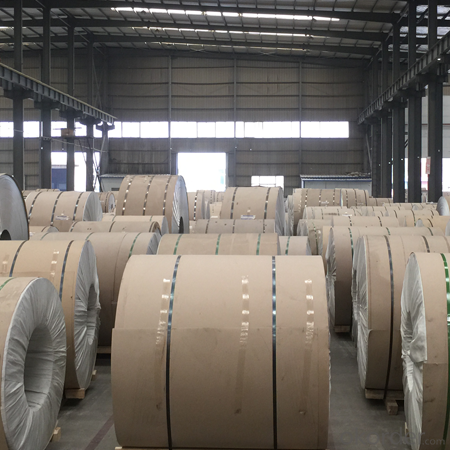
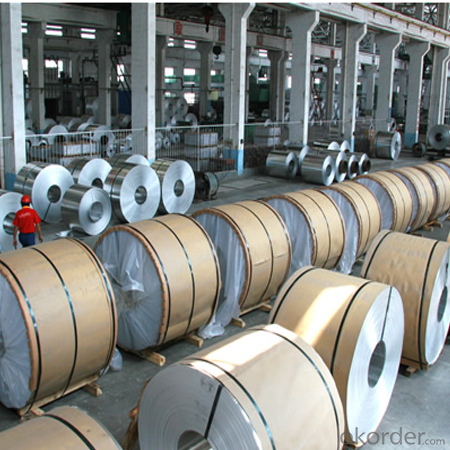
Manufacturing
Decoiler → Accumulator →Tension Leveler →Acid & Alkali Cleaner → Rinse →Conversion Treatment → Priming coater →Infrared Curing Oven →Main coater →Floatation Curing Oven →Strippable Film Applicator → Exit Accumulator → Recoiler
FAQ
--Q: Do you provide free samples?
--A: Yes, free samples will be sent to you on freight at destination.
--Q: Can I get your latest products catalogue?
--A: Yes, it will be sent to you in no time.
--Q: What is the MOQ?
--A: 2 tons
--Q: What are your payment terms?
--A: We accept L/C, T/T.
--Q: What kinds of alloy can you supply?
--A: 1000 series: 1050, 1060, 1070, 1100, 1145, 1200
3000 series: 3003, 3004, 3105, 3104
5000 series: 5052, 5083, 5754, 5182
6000 series: 6061, 6063, 6062, 6063
8000 series: 8011, 8021
--Q: What kinds of temper can you supply?
--A: O-H112: O,H12,H14,H16,H18,H22,H24,H26,H,32,H34,H111,H112
T3, T4, T6
- Q: Can aluminum coils be used in the manufacturing of appliances?
- Yes, aluminum coils can be used in the manufacturing of appliances. Aluminum is a lightweight and durable material that is commonly used in the manufacturing industry due to its excellent thermal conductivity and corrosion resistance properties. These properties make it suitable for various applications, including the production of heating and cooling systems in appliances such as refrigerators, air conditioners, and ovens. Aluminum coils are often used in these appliances to transfer heat efficiently and ensure optimal performance. Additionally, aluminum is a sustainable material as it is highly recyclable, making it an environmentally friendly choice for appliance manufacturers.
- Q: What’s the production standard of aluminum coil?
- GB/T3880-2006 mechanical standard GB/T3190-1996 chemical standard
- Q: Are parakeets allergic to aluminum because I wanted to use a metal pie pan for a bird bath.
- ask a nice bird vet
- Q: What is the primary substance that constitutes an aluminum coil?
- <p>The material of aluminum coil is aluminum, a lightweight, corrosion-resistant, and malleable metal. It is commonly used in various industries due to its excellent electrical conductivity, thermal conductivity, and formability. Aluminum coils are made by rolling aluminum sheets into cylindrical shapes, which can be further processed into different products such as cans, foils, and other applications.</p>
- Q: What is the maximum width and thickness of aluminum coils?
- The specific requirements and capabilities of the manufacturer play a role in determining the potential variation in the maximum width and thickness of aluminum coils. Generally, aluminum coils can have a maximum width that spans from 36 inches to 72 inches, or potentially wider. In terms of thickness, it typically falls within the range of 0.006 inches to 0.25 inches. It is crucial to acknowledge that these measurements may differ across industries and applications. Therefore, it is advisable to consult the manufacturer or supplier to ascertain the particular maximum width and thickness that align with your needs.
- Q: Can aluminum coils be used in the production of aluminum louvers?
- Yes, aluminum coils can be used in the production of aluminum louvers. Aluminum coils are a common raw material used in various industries, including the manufacturing of louvers. Aluminum coils are typically processed and formed into the shape and design required for louvers, providing the necessary strength and durability. The use of aluminum coils also allows for flexibility in design and customization of louvers to meet specific requirements. Additionally, aluminum is a lightweight and corrosion-resistant material, making it suitable for louvers that may be exposed to outdoor conditions. Overall, aluminum coils are widely used in the production of aluminum louvers due to their numerous advantages and suitability for this application.
- Q: This question asks about the duration an aluminum coil can last before it needs to be replaced or becomes unusable.
- <p>The lifespan of an aluminum coil can vary significantly depending on its application, quality of the material, and environmental conditions. Generally, if properly stored and used, aluminum coils can last for several years without significant degradation. However, in industrial settings where coils are subjected to continuous use and harsh conditions, their lifespan might be reduced to a few years or even less. Regular maintenance and inspection can help extend the lifespan of aluminum coils.</p>
- Q: Why does fillet appear when rolling aluminum coil?
- How thick and wide is it when there is such problem? Which is the rolling pass? And what is the type of the rolling mill? The simple 4 rollers or CVC and HC rolling mill with roller control. Does the filler appear in rolling or out of roller? Different thickness will lead to different analysis.
- Q: Some makes like KIA make a point of having aluminum engines. I thought this was for weight, but was more prone to failure, especially in a high mileage car.
- Aluminum is touchy with heat, in comparison to steel. Generally the cylinder sleeves and berring surfaces are steel lined for durability. If you have a good radiator and thermostat, there is no reason the aluminum engine will not last 200,000 miles or more.
- Q: How do aluminum coils perform under low-temperature applications?
- Aluminum coils are known for performing exceptionally well under low-temperature applications. Due to its inherent properties, aluminum is highly resistant to low temperatures and can maintain its structural integrity even in extreme cold conditions. The low thermal expansion coefficient of aluminum allows it to contract and expand without compromising its performance, making it an ideal choice for various low-temperature applications. One of the key advantages of aluminum coils in low-temperature applications is their ability to resist corrosion. Aluminum naturally forms a protective oxide layer that prevents it from rusting or corroding, even in cold and wet environments. This makes aluminum coils highly durable and ensures their longevity, even when exposed to low temperatures for extended periods. Additionally, aluminum has excellent thermal conductivity, which means it effectively transfers heat even at low temperatures. This property is crucial in applications such as refrigeration and air conditioning, where efficient heat transfer is required to maintain the desired temperature levels. Aluminum coils can effectively dissipate heat, ensuring optimal performance in low-temperature environments. Furthermore, aluminum coils are lightweight, which makes them easier to handle and install in low-temperature applications. Their lightweight nature also contributes to energy efficiency, as less energy is required to transport and operate the equipment using aluminum coils. In summary, aluminum coils perform exceptionally well under low-temperature applications. Their resistance to corrosion, thermal conductivity, durability, and lightweight nature make them an ideal choice for various industries, including refrigeration, air conditioning, and low-temperature processing.
Send your message to us
Coil Coated Aluminum Coil/Roll for Aluminum Roofing Panel
- Loading Port:
- Shanghai
- Payment Terms:
- TT OR LC
- Min Order Qty:
- 2 m.t.
- Supply Capability:
- 50000 m.t./month
OKorder Service Pledge
OKorder Financial Service
Similar products
Hot products
Hot Searches
Related keywords
